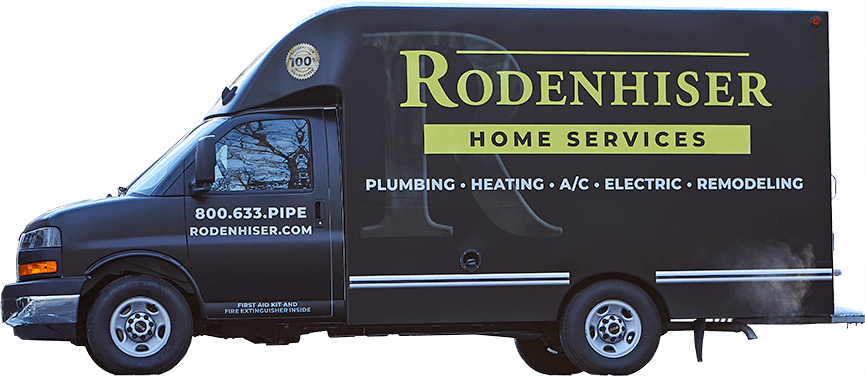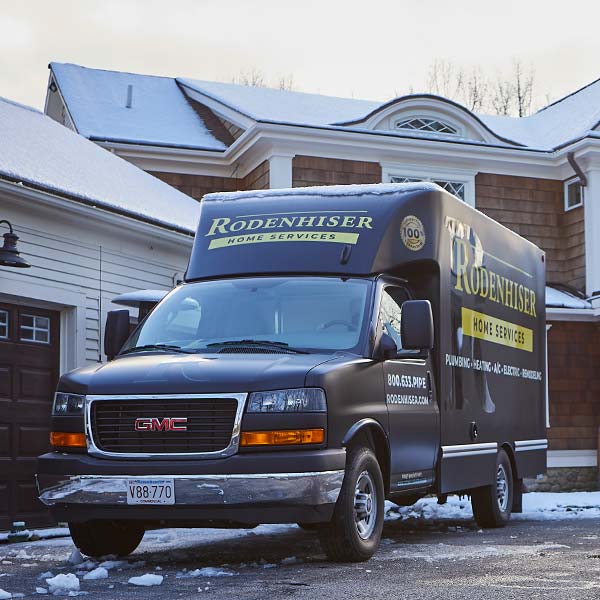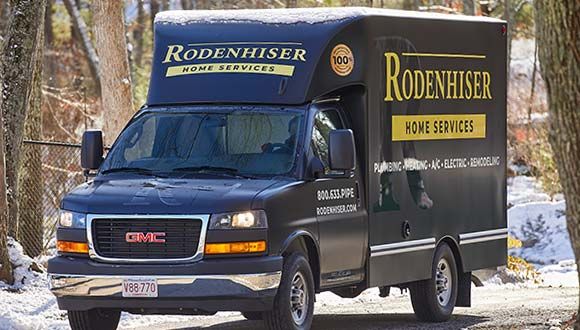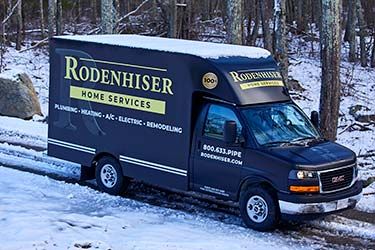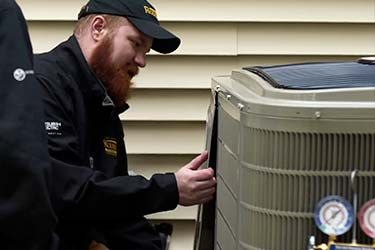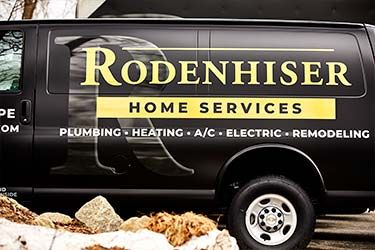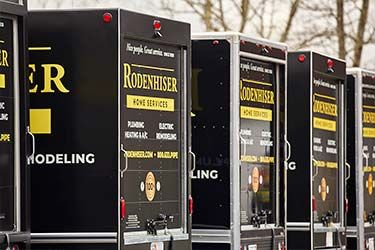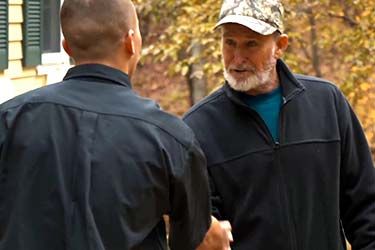How To Be A Smarter MetroWest MA Home Owner?
Ross Pickett:
 In a simple term, the boiler is basically a container of water with a flame underneath, and we want to make sure it has access to plenty of air. The way these forced hot water systems work, the hot water circulates up through the house, makes its way through the radiators, either baseboard or cast iron, heats the room, gives its heat off, and comes back to the boiler in the form of a return line to get heated up again.
In a simple term, the boiler is basically a container of water with a flame underneath, and we want to make sure it has access to plenty of air. The way these forced hot water systems work, the hot water circulates up through the house, makes its way through the radiators, either baseboard or cast iron, heats the room, gives its heat off, and comes back to the boiler in the form of a return line to get heated up again. 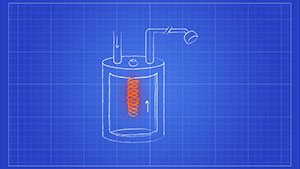 The average boiler, you usually replace anywhere between 18 and 25 years old. The Mass Save program has rebates for changing boilers at that age. They also have rebates for changing boilers beyond that, 30 years or above.
The average boiler, you usually replace anywhere between 18 and 25 years old. The Mass Save program has rebates for changing boilers at that age. They also have rebates for changing boilers beyond that, 30 years or above.
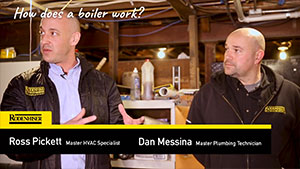 We always want a professional technician to come out once a year. On any gas-fired appliance, they'll come down and make sure the burners are tuned and burning safely because, remember, carbon monoxide is a byproduct of combustion with gas.
We always want a professional technician to come out once a year. On any gas-fired appliance, they'll come down and make sure the burners are tuned and burning safely because, remember, carbon monoxide is a byproduct of combustion with gas.
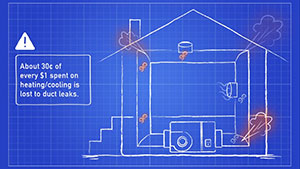 Any duct system has two sides. It's breathing air from in the house, heating it, and then delivering it out the other end. You can never really send more air into a home without taking some away. Most importantly, does it have enough air to breathe?
Any duct system has two sides. It's breathing air from in the house, heating it, and then delivering it out the other end. You can never really send more air into a home without taking some away. Most importantly, does it have enough air to breathe?
Dan Messina:
What you really want to pay attention to here is how much snow builds up over here, because you don't want the snow to get above any of these vents right here. You want to keep it away from there so that your appliances, your gas appliances downstairs can vent out.
Ross Pickett:
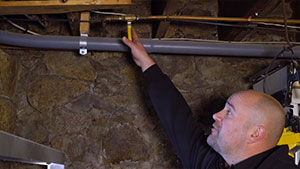 Don, every homeowner should know where their main shutoff valve is. The reason is, if there's ever an emergency like a plumbing leak or, in your case because you have forced hot water, even a leak from one of your radiators or part of the heating system, you need to be able to shut the water off to prevent any damage.
Don, every homeowner should know where their main shutoff valve is. The reason is, if there's ever an emergency like a plumbing leak or, in your case because you have forced hot water, even a leak from one of your radiators or part of the heating system, you need to be able to shut the water off to prevent any damage.
Dan Messina:
In some situations, we do see the piping for outside faucets freezing, but on this specific one that you have that's a pretty nice setup is is you have your shutoff right here. In most cases, you'll shut the water off inside, open the spigot outside to make sure that any water that's in there can escape. Then you actually have a little drain that's right here too that you can open this up, and it'll let the water ... Any residual water that's in there will drain out of there.
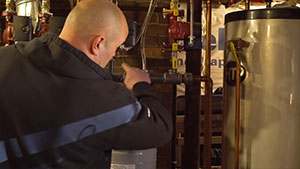 Over here is your water heater. It actually is connected to your heating system. The piping actually goes through down there, and it acts like another zone of heat that you have in your home. It runs off of its own thermostat. It's called an aquastat, which is a control on the side over there, and that works the same way as a thermostat in the rest of your home, gets to a certain temperature, it shuts off the pump, and it stops heating your water. The water from your heating system here goes through that, and it heats indirectly for your domestic hot water for your bathing, so you have some nice hot water.
Over here is your water heater. It actually is connected to your heating system. The piping actually goes through down there, and it acts like another zone of heat that you have in your home. It runs off of its own thermostat. It's called an aquastat, which is a control on the side over there, and that works the same way as a thermostat in the rest of your home, gets to a certain temperature, it shuts off the pump, and it stops heating your water. The water from your heating system here goes through that, and it heats indirectly for your domestic hot water for your bathing, so you have some nice hot water.
Ross Pickett:
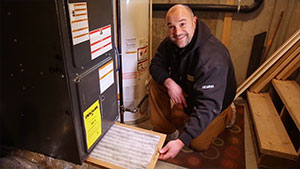 The filters are really important for maintenance. They always recommend you change it every month, month and a half of runtime. Not only does it change the actual air in the house and protect the people living in the house, but it also protects your equipment, and it really helps in terms of lengthening the lifespan. Whether you're cooling or you're heating, it's still blowing the air through that coil every single time, even in the winter, so it's important to have a technician check on it. They can always clean it. Also, from a homeowner's standpoint, the more you change the filter, the more you protect all those particulates from getting caught in there.
The filters are really important for maintenance. They always recommend you change it every month, month and a half of runtime. Not only does it change the actual air in the house and protect the people living in the house, but it also protects your equipment, and it really helps in terms of lengthening the lifespan. Whether you're cooling or you're heating, it's still blowing the air through that coil every single time, even in the winter, so it's important to have a technician check on it. They can always clean it. Also, from a homeowner's standpoint, the more you change the filter, the more you protect all those particulates from getting caught in there.
 When you call to get a single issue fixed ... A lot of times, these things are found during a maintenance, and it's usually found during a maintenance a lot easier because they're not so focused on a problem but, instead, they take their time and go through a long checklist that we have. When you really do a comprehensive overview of the whole system, you end up finding out what the problem was.
When you call to get a single issue fixed ... A lot of times, these things are found during a maintenance, and it's usually found during a maintenance a lot easier because they're not so focused on a problem but, instead, they take their time and go through a long checklist that we have. When you really do a comprehensive overview of the whole system, you end up finding out what the problem was.
Weston Smarter Home Owner Tips
Ross Pickett:
 In a simple term, the boiler is basically a container of water with a flame underneath, and we want to make sure it has access to plenty of air. The way these forced hot water systems work, the hot water circulates up through the house, makes its way through the radiators, either baseboard or cast iron, heats the room, gives its heat off, and comes back to the boiler in the form of a return line to get heated up again.
In a simple term, the boiler is basically a container of water with a flame underneath, and we want to make sure it has access to plenty of air. The way these forced hot water systems work, the hot water circulates up through the house, makes its way through the radiators, either baseboard or cast iron, heats the room, gives its heat off, and comes back to the boiler in the form of a return line to get heated up again.  The average boiler, you usually replace anywhere between 18 and 25 years old. The Mass Save program has rebates for changing boilers at that age. They also have rebates for changing boilers beyond that, 30 years or above.
The average boiler, you usually replace anywhere between 18 and 25 years old. The Mass Save program has rebates for changing boilers at that age. They also have rebates for changing boilers beyond that, 30 years or above.
 We always want a professional technician to come out once a year. On any gas-fired appliance, they'll come down and make sure the burners are tuned and burning safely because, remember, carbon monoxide is a byproduct of combustion with gas.
We always want a professional technician to come out once a year. On any gas-fired appliance, they'll come down and make sure the burners are tuned and burning safely because, remember, carbon monoxide is a byproduct of combustion with gas.
 Any duct system has two sides. It's breathing air from in the house, heating it, and then delivering it out the other end. You can never really send more air into a home without taking some away. Most importantly, does it have enough air to breathe?
Any duct system has two sides. It's breathing air from in the house, heating it, and then delivering it out the other end. You can never really send more air into a home without taking some away. Most importantly, does it have enough air to breathe?
Dan Messina:
What you really want to pay attention to here is how much snow builds up over here, because you don't want the snow to get above any of these vents right here. You want to keep it away from there so that your appliances, your gas appliances downstairs can vent out.
Ross Pickett:
 Don, every homeowner should know where their main shutoff valve is. The reason is, if there's ever an emergency like a plumbing leak or, in your case because you have forced hot water, even a leak from one of your radiators or part of the heating system, you need to be able to shut the water off to prevent any damage.
Don, every homeowner should know where their main shutoff valve is. The reason is, if there's ever an emergency like a plumbing leak or, in your case because you have forced hot water, even a leak from one of your radiators or part of the heating system, you need to be able to shut the water off to prevent any damage.
Dan Messina:
In some situations, we do see the piping for outside faucets freezing, but on this specific one that you have that's a pretty nice setup is is you have your shutoff right here. In most cases, you'll shut the water off inside, open the spigot outside to make sure that any water that's in there can escape. Then you actually have a little drain that's right here too that you can open this up, and it'll let the water ... Any residual water that's in there will drain out of there.
 Over here is your water heater. It actually is connected to your heating system. The piping actually goes through down there, and it acts like another zone of heat that you have in your home. It runs off of its own thermostat. It's called an aquastat, which is a control on the side over there, and that works the same way as a thermostat in the rest of your home, gets to a certain temperature, it shuts off the pump, and it stops heating your water. The water from your heating system here goes through that, and it heats indirectly for your domestic hot water for your bathing, so you have some nice hot water.
Over here is your water heater. It actually is connected to your heating system. The piping actually goes through down there, and it acts like another zone of heat that you have in your home. It runs off of its own thermostat. It's called an aquastat, which is a control on the side over there, and that works the same way as a thermostat in the rest of your home, gets to a certain temperature, it shuts off the pump, and it stops heating your water. The water from your heating system here goes through that, and it heats indirectly for your domestic hot water for your bathing, so you have some nice hot water.
Ross Pickett:
 The filters are really important for maintenance. They always recommend you change it every month, month and a half of runtime. Not only does it change the actual air in the house and protect the people living in the house, but it also protects your equipment, and it really helps in terms of lengthening the lifespan. Whether you're cooling or you're heating, it's still blowing the air through that coil every single time, even in the winter, so it's important to have a technician check on it. They can always clean it. Also, from a homeowner's standpoint, the more you change the filter, the more you protect all those particulates from getting caught in there.
The filters are really important for maintenance. They always recommend you change it every month, month and a half of runtime. Not only does it change the actual air in the house and protect the people living in the house, but it also protects your equipment, and it really helps in terms of lengthening the lifespan. Whether you're cooling or you're heating, it's still blowing the air through that coil every single time, even in the winter, so it's important to have a technician check on it. They can always clean it. Also, from a homeowner's standpoint, the more you change the filter, the more you protect all those particulates from getting caught in there.
 When you call to get a single issue fixed ... A lot of times, these things are found during a maintenance, and it's usually found during a maintenance a lot easier because they're not so focused on a problem but, instead, they take their time and go through a long checklist that we have. When you really do a comprehensive overview of the whole system, you end up finding out what the problem was.
When you call to get a single issue fixed ... A lot of times, these things are found during a maintenance, and it's usually found during a maintenance a lot easier because they're not so focused on a problem but, instead, they take their time and go through a long checklist that we have. When you really do a comprehensive overview of the whole system, you end up finding out what the problem was.
Holliston Smarter Home Owner Tips
Ross Pickett:
 In a simple term, the boiler is basically a container of water with a flame underneath, and we want to make sure it has access to plenty of air. The way these forced hot water systems work, the hot water circulates up through the house, makes its way through the radiators, either baseboard or cast iron, heats the room, gives its heat off, and comes back to the boiler in the form of a return line to get heated up again.
In a simple term, the boiler is basically a container of water with a flame underneath, and we want to make sure it has access to plenty of air. The way these forced hot water systems work, the hot water circulates up through the house, makes its way through the radiators, either baseboard or cast iron, heats the room, gives its heat off, and comes back to the boiler in the form of a return line to get heated up again.  The average boiler, you usually replace anywhere between 18 and 25 years old. The Mass Save program has rebates for changing boilers at that age. They also have rebates for changing boilers beyond that, 30 years or above.
The average boiler, you usually replace anywhere between 18 and 25 years old. The Mass Save program has rebates for changing boilers at that age. They also have rebates for changing boilers beyond that, 30 years or above.
 We always want a professional technician to come out once a year. On any gas-fired appliance, they'll come down and make sure the burners are tuned and burning safely because, remember, carbon monoxide is a byproduct of combustion with gas.
We always want a professional technician to come out once a year. On any gas-fired appliance, they'll come down and make sure the burners are tuned and burning safely because, remember, carbon monoxide is a byproduct of combustion with gas.
 Any duct system has two sides. It's breathing air from in the house, heating it, and then delivering it out the other end. You can never really send more air into a home without taking some away. Most importantly, does it have enough air to breathe?
Any duct system has two sides. It's breathing air from in the house, heating it, and then delivering it out the other end. You can never really send more air into a home without taking some away. Most importantly, does it have enough air to breathe?
Dan Messina:
What you really want to pay attention to here is how much snow builds up over here, because you don't want the snow to get above any of these vents right here. You want to keep it away from there so that your appliances, your gas appliances downstairs can vent out.
Ross Pickett:
 Don, every homeowner should know where their main shutoff valve is. The reason is, if there's ever an emergency like a plumbing leak or, in your case because you have forced hot water, even a leak from one of your radiators or part of the heating system, you need to be able to shut the water off to prevent any damage.
Don, every homeowner should know where their main shutoff valve is. The reason is, if there's ever an emergency like a plumbing leak or, in your case because you have forced hot water, even a leak from one of your radiators or part of the heating system, you need to be able to shut the water off to prevent any damage.
Dan Messina:
In some situations, we do see the piping for outside faucets freezing, but on this specific one that you have that's a pretty nice setup is is you have your shutoff right here. In most cases, you'll shut the water off inside, open the spigot outside to make sure that any water that's in there can escape. Then you actually have a little drain that's right here too that you can open this up, and it'll let the water ... Any residual water that's in there will drain out of there.
 Over here is your water heater. It actually is connected to your heating system. The piping actually goes through down there, and it acts like another zone of heat that you have in your home. It runs off of its own thermostat. It's called an aquastat, which is a control on the side over there, and that works the same way as a thermostat in the rest of your home, gets to a certain temperature, it shuts off the pump, and it stops heating your water. The water from your heating system here goes through that, and it heats indirectly for your domestic hot water for your bathing, so you have some nice hot water.
Over here is your water heater. It actually is connected to your heating system. The piping actually goes through down there, and it acts like another zone of heat that you have in your home. It runs off of its own thermostat. It's called an aquastat, which is a control on the side over there, and that works the same way as a thermostat in the rest of your home, gets to a certain temperature, it shuts off the pump, and it stops heating your water. The water from your heating system here goes through that, and it heats indirectly for your domestic hot water for your bathing, so you have some nice hot water.
Ross Pickett:
 The filters are really important for maintenance. They always recommend you change it every month, month and a half of runtime. Not only does it change the actual air in the house and protect the people living in the house, but it also protects your equipment, and it really helps in terms of lengthening the lifespan. Whether you're cooling or you're heating, it's still blowing the air through that coil every single time, even in the winter, so it's important to have a technician check on it. They can always clean it. Also, from a homeowner's standpoint, the more you change the filter, the more you protect all those particulates from getting caught in there.
The filters are really important for maintenance. They always recommend you change it every month, month and a half of runtime. Not only does it change the actual air in the house and protect the people living in the house, but it also protects your equipment, and it really helps in terms of lengthening the lifespan. Whether you're cooling or you're heating, it's still blowing the air through that coil every single time, even in the winter, so it's important to have a technician check on it. They can always clean it. Also, from a homeowner's standpoint, the more you change the filter, the more you protect all those particulates from getting caught in there.
 When you call to get a single issue fixed ... A lot of times, these things are found during a maintenance, and it's usually found during a maintenance a lot easier because they're not so focused on a problem but, instead, they take their time and go through a long checklist that we have. When you really do a comprehensive overview of the whole system, you end up finding out what the problem was.
When you call to get a single issue fixed ... A lot of times, these things are found during a maintenance, and it's usually found during a maintenance a lot easier because they're not so focused on a problem but, instead, they take their time and go through a long checklist that we have. When you really do a comprehensive overview of the whole system, you end up finding out what the problem was.
Ductless Mini Split Installation Is a Job for Pros, But Here's What You Can Do to Get Ready
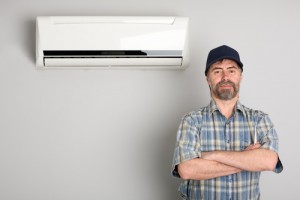 With benefits such as smaller size, higher energy efficiency and greater interior design flexibility compared to traditional ducted A/C systems, it's no surprise ductless mini split installations are becoming more popular.
With benefits such as smaller size, higher energy efficiency and greater interior design flexibility compared to traditional ducted A/C systems, it's no surprise ductless mini split installations are becoming more popular.
However, if ductless installations aren't handled by a professional, disadvantages of the technology can easily outweigh the benefits:

